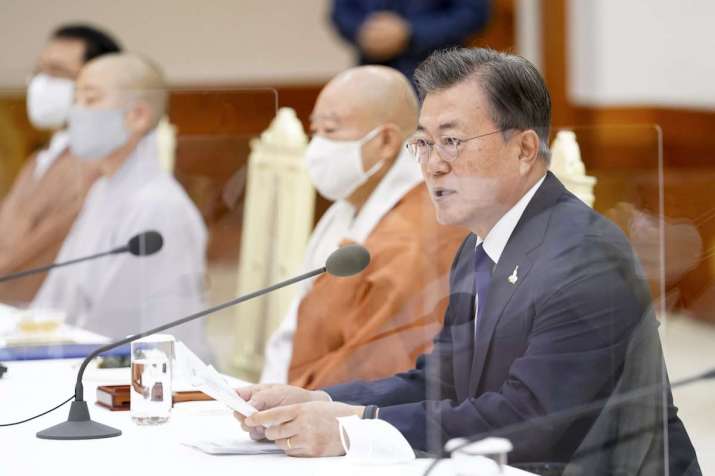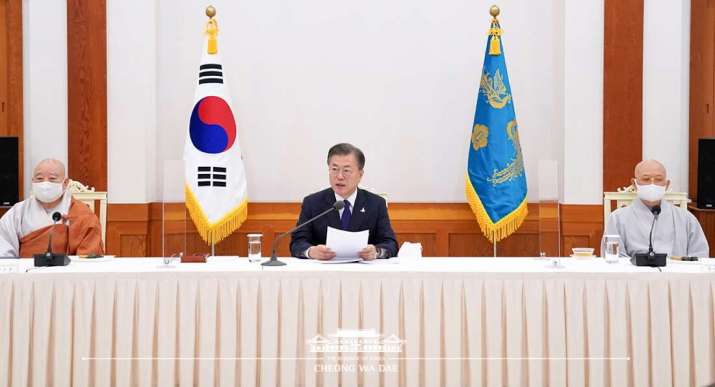
Speaking at a meeting with Buddhist leaders last week, South Korean president Moon Jae-in requested the continued support of the Buddhist community in South Korea in efforts to open the way for further dialogue and exchanges with North Korea to advance the path toward peace on the Korean Peninsula and eventual reunification.
Moon emphasized that Buddhism had long been a key support in helping South Korea overcome numerous hardships and he expressed confidence that the path to peace and reunification remained open as long as there was still hope for further dialogue with Pyongyang.
“Buddhism has been a source of strength that has helped Koreans endure their ordeals for over 1,700 years,” said Moon. “Buddhism has always stood beside those striving for our country’s defense, independence, democracy, and peace. I hope the Buddhist community will continually join forces to open a path toward inter-Korean exchanges and advancing peace on the Korean Peninsula.” (Cheong Wa Dae)
Moon was speaking to the Buddhist leaders on 18 September at his official residence Cheong Wa Dae—known informally as the Blue House—on the eve of the two-year anniversary of Moon’s Pyongyang Summit agreement with North Korea.
“In 2018, Chairman Kim Jong-un and I declared to the 80 million Koreans and the world that we will move toward peace on the Korean Peninsula,” Moon observed. “The Buddhist community held a special service to pray for peace and stability on the peninsula in the lead up to the inter-Korean summit. Just as you had in 2019, your community prayed once more this year for peaceful unification.” (Cheong Wa Dae)
Three historic inter-Korean summits were held in 2018, culminating in a three-day meeting in Pyongyang for President Moon and North Korean leader Kim Jong-un on 18–20 September 2018. The meeting’s primary agenda was to seek a breakthrough in stalled talks with the US and a strategy for denuclearization on the Korean Peninsula. An agreement, titled the Pyongyang Joint Declaration of September 2018, was jointly signed by Moon and Kim on 19 September.
During the first of the three summits, held in the Panmunjom Joint Security Area on 27 April 2018, Moon and Kim adopted the joint Panmunjom Declaration for Peace, Prosperity and Unification of the Korean Peninsula, in which both leaders affirmed their commitment to denuclearization and expressed a wish to bring a formal end to long-running hostilities.
Since the signing of the Korean Armistice Agreement in Panmunjom on 27 July 1953, the two Koreas have officially remained at war, but the Moon and Kim agreed to convert the armistice agreement into a full peace treaty later in 2018 to formally end the Korean War after 65 years. Further talks on the subject were later cancelled by Kim, who blamed US-South Korean military exercises. At a second summit held on 26 May 2018 at Panmunjom, Moon and Kim met for two hours, during which the two leaders agreed to accelerate implementation of the Panmunjom Declaration,
“If [we] don’t give up hope for meetings and dialogue, we will surely move on to the path of peace and unification,” Moon told the gathered Buddhist leaders last week. (The Korea Herald)

The South Korean president also expressed gratitude to the Buddhist community for cooperating the government’s campaign against the SARS-CoV-2 novel coronavirus pandemic. Moon noted that Korean Buddhist communities had suspended regular religious services and even canceled the famed annual Lotus Lantern Festival earlier this year, for the first time in 40 years, despite an ongoing bid to have the historic festival, which has a history that stretches back more than 1,200 years to Korea’s ancient Silla (신라) period (c.57 BCE–935 CE), officially inscribed by UNESCO as Intangible Cultural Heritage.**
“The spirit of compassion and mutual benefit as practiced by Buddhism has long permeated the hearts of our people,” Moon stated. “While fighting against COVID-19, we have come to realize more keenly the fact that we are all linked to one another. We have also based Korea’s response to COVID-19 on the will to care for and embrace our neighbors. This is no different from the teaching of Buddhism: ‘Because all living beings are sick, therefore I am sick.’” (Cheong Wa Dae)
At the time of writing on 25 September, the South Korea government, which was one of the fastest in the world in its response to contain the local outbreak, had reported 23,455 confirmed cases of COVID-19 and 395 deaths, with 20,978 people reported to have recovered.*Moon requested the Buddhist community’s continued support for national efforts to eliminate COVID-19, which he described as turning into a “prolonged fight” with no end in sight. (The Korea Herald)
According to census data for 2015, the majority of South Korea’s population—56.1 per cent—holds no religious affiliation. Christians make up the largest religious segment of the population at 27.6 per cent, while Buddhists account for 15.5 per cent. While official statistics for North Korea are unknown, the Washington, DC-based Pew Research Center estimates that 71 per cent of North Koreans have no religious affiliation, with “other” religions accounting for 12.9 per cent, folk religions 12.3 percent, Christianity 2 per cent, and Buddhists 1.5 per cent.
** Korean Buddhists Cancel Lotus Lantern Festival as Pandemic Caution Lingers (Buddhistdoor Global)
See more
Moon says Korea peace possible without giving up hope for dialogue (The Korea Herald)
Moon: S. Korea Will Reach Path to Peace by Not Giving Up on Dialogue with N. Korea (KBS World Radio)
Remarks by President Moon Jae-in at Meeting with Leaders of Korean Buddhism (Chong Wa Dae)












